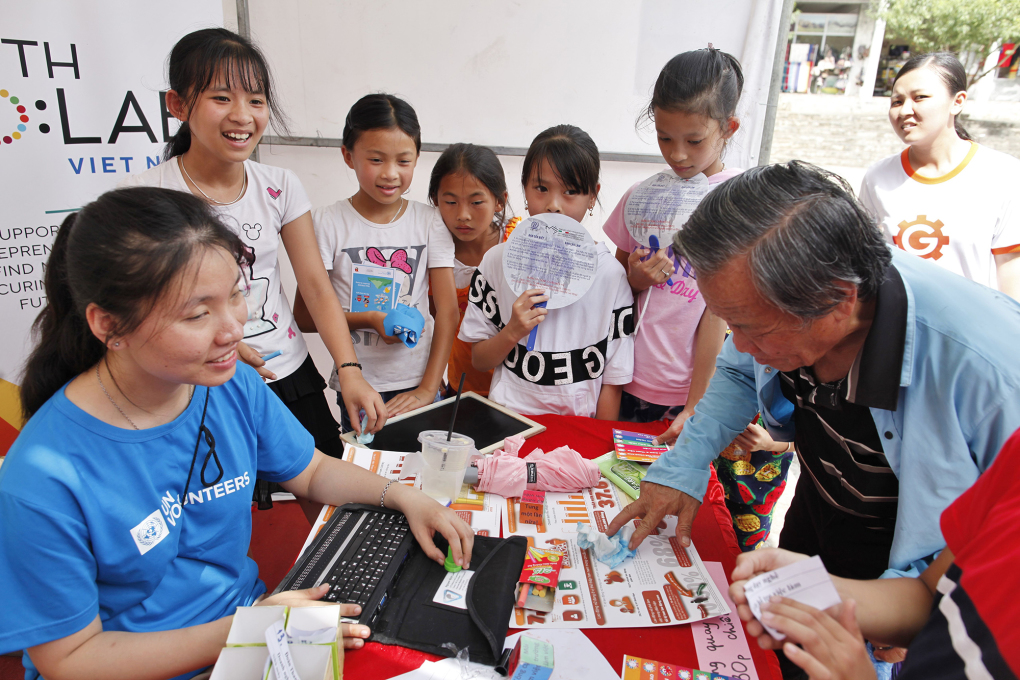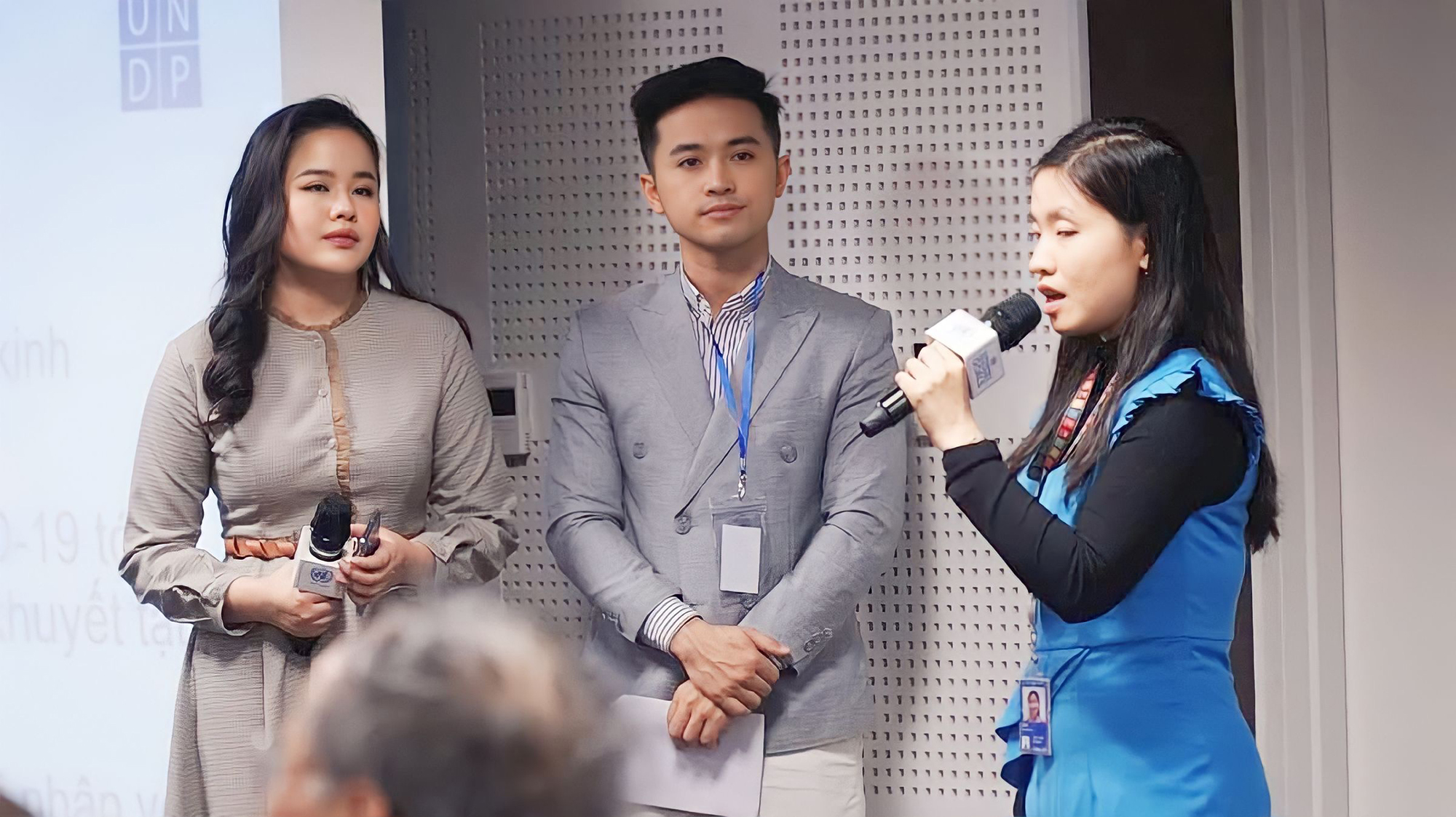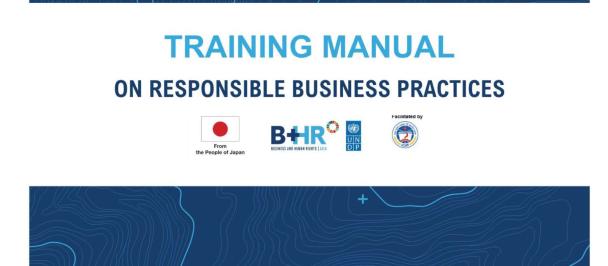The girl who ‘sees’ with technology
March 8, 2023

Thu Huong (far left) with children in Ha Giang province at a UN program, 2021.
As published in VnExpress on 23 February, 2023
Thu Huong opened the app to book a trip and used her cane to walk to the door and wait for the motorbike driver to come to take her to the office.
Dao Thu Huong works for the UN Development Program (UNDP) in Viet Nam. She turned on the computer and handled familiar tasks every morning such as checking emails and messages, reading reports, and exchanging with colleagues on social networks. Watching her working, many people would not believe that Huong became visually impaired when she was 10.
"My computer emits voice, so colleagues at UNDP give me a separate room to listen, so it does not disturb others," explained Thu Huong, 38.
Since she was born, Huong’s eyesight has been very poor and she completely lost her vision when she was 10. She went to Nguyen Dinh Chieu School for the Visually Impaired Students to learn how to read and write Braille, then started to blend in and studied with sighted students. Throughout her education, she was always among the top students, being admitted directly to university and becoming the valedictorian of the English Faculty, Ha Noi Pedagogical University.
"Foreign language helps me get scholarships for exchanges in Thailand, Korea, Japan, and Master’s Program in Australia, and the technologies compensates for my eyes," Huong said.
Smartphones today have voice features like VoiceOver in iPhone or Talkback in Android, enabling blind people like Huong to use all applications. "The technology of scanning and reading enables me to process printing documents and acquire knowledge like a sighted person," Huong said.
Life of Ms. Nguyen Thi Hanh, 67 years old, (Huong's mother) also becomes less arduous thanks to technology. In the past, she gave up all opportunities for promotion and worked as an ordinary police officer to have time to take care of her children. When Huong was still able to see a little bit, Hanh highlighted the text for Huong to read. When Huong could no longer see anything, every night and early in the morning, Hanh sat next to Huong to read each of every page for her to study.
"In the previous years, I always felt sorry for my mother. Especially when I was in grade 10, my mother sold her motorbike to have money to buy me a second-hand laptop," Huong said. But with the computer, Huong found it easier to study and submit assignments, and her mother did not have to sit next to her to read out loud all the texts.
Huong used to feel guilty as for many years, regardless of sun or rain, she sat behind her mom who is getting older and weaker day by day. Huong thought of the scene where one day her mother's eyes were blurred, her limbs were weak, and she still had to take her to work. "Technology motorbike taxi is my savior," Huong said. Since then, Hanh has been at ease when letting the driver take her daughter to work and other places because she always knows the route or the driver’s information.
The technological development in the banking sector and payment is another stepping stone in the journey to independence of the blind girl.
Huong opened a bank account in 2010 with the help of her ex-employer and used it online for 6 years without any issue. In 2017, she had to go to the bank office. At that time, bank employees were extremely confused when they knew that their customers were blind. They called the branch director for directions and explained that according to the legal regulations, blind people cannot have a bank account under their name. "I turned on the computer, accessed my account and went through steps to prove that I could do all the transactions myself," Huong said.
Witnessing Huong's independence, the bank agreed to let her continue using the account but with many restrictions such as the limited number of times and transactions per day, the requirement that all transactions must be in a sighted person’s name; the required presence of a sighted guardian in any transactions that she wants to make.
After that, Thu Huong went to another bank. This time she was able to register a bank account with her own name and have the full rights after proving her independence. Since she had her own bank account, Huong had a clearer plan of spending and saving. She can also buy what she likes herself. "This week, I just ordered a set of cosmetics online after reading the information and previous users’ reviews," Huong said. She also uses cash reader software to identify the banknote value, thus being able to spend money in cash.

Thu Huong (right) spoke at the seminar on digital entrepreneurship opportunities for people with disabilities in 2021.
In 2018, UNDP in Viet Nam recruited staff for the position “disability rights officer”. This is project to promote Viet Nam’s accession to the Marrakesh Treaty - through removing legal barriers, enabling people with disabilities to convert printed books into audio books or other accessible formats without permission from the publishing houses and the authors.
Having worked on a similar project three years ago, Huong knew about the Marrakesh Treaty. "I always want to introduce the advantages of technology to people with disabilities so that they can fully live their lives," she said. Because her experience and vision aligned with the expectations for this position, Dao Thu Huong got the job.
For three years, Thu Huong worked with the Blind Association to build a roadmap and advocate for the Marrakesh Treaty with relevant agencies, worked with the Ministry of Culture to develop an application for accession to the treaty, and at the same time, conducting a joint research on the compatibility of Viet Nam's Intellectual Property Law with the Marrakesh Treaty.
On 6 December 2022, in Geneva, Switzerland, Viet Nam officially became a member of the Marrakesh Treaty. Dao Thu Huong rejoiced not only because she participated in the accession process, but also from now on more than one million visually impaired people, people who are unable to read printed text and other people with disabilities can access published work more easily.
"Now I am proud that I am able to live my life independently and repay the love of my mother instead of being a burden for her," Dao Thu Huong said.
In the old house, looking at Huong working attentively on her desk, Hanh happily shares that her daughter will get married in half a month. On the face of the mother who once looked
austere, now only contentment can be seen.

 Locations
Locations



